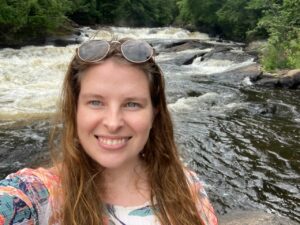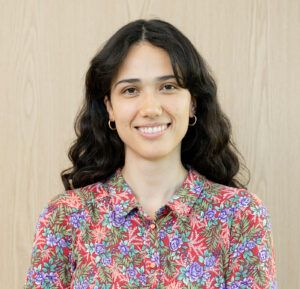Of trees and elephants: embracing a relational science
Written by Keziah Mayer and edited by Valeria Mendez
Photos by Liebrecht Fick
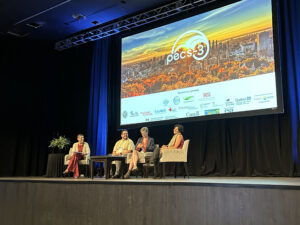
This blog post is part of a series reflecting on a selection of sessions and keynotes that were presented at the PECS-III Conference, Montreal Canada, 12-15 August 2024
Stand up tall, with the crown of your head pointing into the cosmos and feet firmly kissing the earth. Imagine roots growing out of your feet, entering the Earth and spreading down, connecting you to Earth- grounding you. Now feel those roots spreading horizontally, and finding the roots of others, connecting you to them, embracing their roots. Breath in and Breath out. Feel these connections to nature and to people that exist.
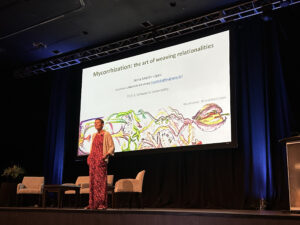
Prof. Berta Martín-López used this vivid metaphor to open the plenary session with the intention of encouraging fungi-like thinking in social-ecological systems research. The opening also served as a grounding exercise for each person in the room, to bring us into the room and to acknowledge ourselves in relation to others.
Thinking like fungi is to think beyond the visible, and to envision the connections between things that were previously thought of as alone and separate. Instead of alone, we are connected and all beneficiaries of integrated social-ecological reciprocity. Although this understanding might reside in all of us, our languages, worldviews and even our research unintentionally reproduces the separationist thinking that we are trying to overcome. Phrases like “human-nature”, “social-ecological”, “mind-body” aims to communicate connections however it instead creates arbitrary dualisms.
Many cultures have words and understanding that capture the rich and diverse relationships and engagements between people and nature, with associated ways of being human in community and nature, from the Shona “ukama” to the Māori “whakapapa”. Berta invited us to thus move from translations to ‘trans-languages’ and from universal to ‘plurivers(al)’ knowledge.
The pluriversal invitation asks us as scientists to trans-form ourselves and how we engage in our science to be more reflective in the stories that we create and perpetuate. To move from categorization and stereotyping to relationality and an understanding of threads woven in a tapestry to make a complex, yet fuller and more whole story.
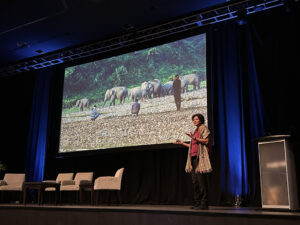
This concept of relationality and complex entangled social-ecological systems was then further explored through Dr. Divya Vasudev’s case study of human–elephant interactions and elephant connectivity in India. Divya spoke of how, in general, people in India revere elephants and in Assam, Northeast India, refer to elephants as “Baba” or Father. However, this sentiment got more complicated when zoomed in to a more local scale where elephant–human interactions can be negative. Elephant sometimes raid grain stored in homes, demolish whole crops and cause injury and even death.
The aim of Divya and her colleagues’ is to improve connectivity of elephant habitats and reduce conflict between humans and elephants. They do this by identifying the root causes of the problem, coming up with practical solutions to the issues and implementing solutions. Some solutions were to build elephant-proof granaries so that elephants don’t raid homes; adding solar-powered streetlights in labour villages inside tea estates to decrease accidental human–elephant encounters; and creating mobile games to discourage kids from chasing elephants because they think it’s cool.
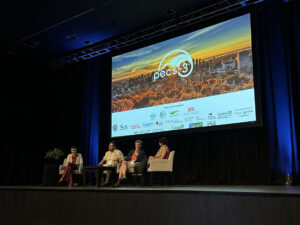
After Divya’s presentation, Dr. Rafael Calderòn-Contreras and Dr. Kate Sheridan joined Divya and Berta on stage for a discussion on these two perspectives of relationality. Rafa pointed out that fragmentation and disconnection were root causes of the challenges that inspired both presentations and asked what steps each presenter suggests for overcoming this disconnect and fragmentation in each context.
Divya relayed that people in landscapes where she works fear loss of livelihoods and life due to elephants and yet they still believe in elephants’ intrinsic right to live and thrive in the area. This deep respect and reverence of elephants must be reinforced in the youth, she pointed out, and practical issue-based solutions can help reduce conflicts and foster deep connections between elephants and humans.
Berta spoke about how institutional settings and the language and tools used in these institutions are not neutral. She also highlighted that some methods aimed at fostering biodiversity can work for nature but undermine relationships between people and nature. The example given was how payments for ecosystem services can improve the functioning of ecosystems, but they also encourage the view of nature as a commodity and thus undervalues it.
Kate observed that the power of relational thinking poses a challenge to PECS in how we train and teach relational thinking in these spaces. Divya spoke of paying attention to both ecological and social sciences, as well as merging scientific and other knowledges. Berta added that we need many types of knowledge and should thus turn down the volume of some knowledge types so that other knowledges can be heard, thus urging for researchers to have polyamorous epistemologies.
In this session, Berta spoke the words that are in my heart that I did not have the vocabulary for and Divya provided real world experiences to ground very conceptual understandings of the dualisms between loving nature and living with nature.

